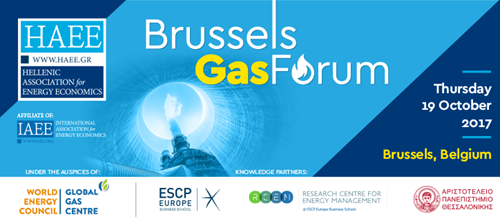Tel: +30 210 92 30 422
E-mail: info@haee.gr
Address
62, Charilaou Trikoupi Str.
Kifissia, 14562
Athens, Greece

The Hellenic Association for Energy Economics (HAEE) successfully organized an international Forum, titled “HAEE Brussels Gas Forum”, which took place on the 19th of October 2017, at the European Parliament Building | Room "Loyola de Palacio", in Brussels, Belgium.
In a spirit of close cooperation, Greece and Cyprus presented their positions during an international gas forum organized by the Hellenic Association for Energy Economics (HAEE) on Thursday 19.10.2017, that took place in the European Parliament in Brussels. The integration of natural gas into the European energy environment and its methods of exploitation was highlighted during the event. The keynote speakers, Maria Spyraki, Member of the European Parliament and representative of New Democracy and Nikolas Papadopoulos, leader of DIKO party and candidate for the presidency in the upcoming elections in Cyprus, underlined the necessity of expanding the use of natural gas and its promotion from the Eastern Mediterranean region to Europe, with the cooperation of Greece and Cyprus and through the well-known projects that are supported by the Commission, such as the East-Med pipeline and the LNG terminal in Alexandroupolis.
The fact that Greece is the only country in Europe to impose excise duty on natural gas when used as feedstock than as a fuel was the main message addressed. This excise duty, which was imposed solely on the use of natural gas and not to other energy resources, is in contrary to the principle of competition advocated by the European Union, even though nowadays the country is trying to assist its economy by the development and rationalization of its industrial fabric. The detailed analysis of the unique Greek problem for Europe was made by presenting the study "The Excise Duty on Natural Gas when used as Feedstock" by Filippos Ioannidis, PhD candidate of Aristotle University of Thessaloniki. During the presentation, the economic and legislative aspect of the issue, which creates conditions of unfair competition at the expense of the Greek economy, was thoroughly analyzed.
Mr. Ioannidis pointed out that the taxation of natural gas for industrial uses when used as feedstock creates additional obstacles and puts extra pressures on the hard-tested Greek economy and does not assist economic recovery. Specifically, it was reported that from 2010 to 2015 the economic activity in the industrial sector underwent a drastic contraction of 27%. In Greece, an excise tax was levied on natural gas in 2011, without foreseeing any exemptions or discounts, based on usage or consumption volumes, and in addition he stated that the specific excise duty is in contract with the EU Directive 2003/96/EC and undermines the competitiveness of the Greek industry by significantly increasing production costs.